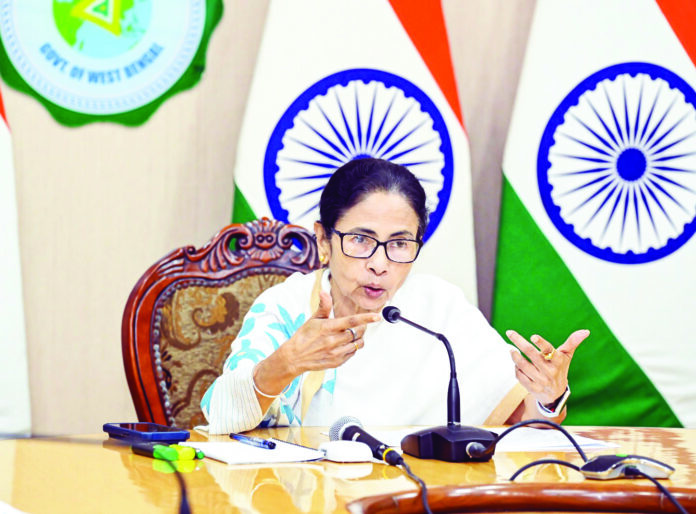
West Bengal government’s bill proposed to revoke, rescind, and discontinue all existing industrial incentive schemes and related obligations with retrospective effect from their respective dates of implementation.
Mamata Banerjee has been managing the state of West Bengal uninterrupted since 2011 based on three pillars—Populism, Policing and Propaganda. If one has to choose the most effective of these three pillars, populism stands out. In fact, it is the foundation of success for the other two pillars—policing and propaganda. Her populist policy of providing free money to people has created a deep-rooted support base for her administration. Thus, any corruption, nepotism or brutality receives much less attention to a large section of beneficiaries than their concern of the next round of funds flowing in their pockets. That this factor alone is politically critical—although denied by Trinamool Congress—was apparent in the Revocation of West Bengal Incentive Schemes and Obligations in the Nature of Grants and Incentives Bill, 2025. The new Act sought to reallocate state funds from financial incentives for industrial units to social welfare schemes, prioritising the needs of the marginalised. The fact that even a vocal opposition led by Suvendu Adhikary kept quiet on this illustrates the fact that doles are more important in the state than creating productive employment opportunities.
The West Bengal government’s bill proposed to revoke, rescind, and discontinue all existing industrial incentive schemes and related obligations with retrospective effect from their respective dates of implementation. The Statement of Objects and Reasons cited the limited industrial impact, disproportionate benefits to a few enterprises, financial strain on the state exchequer, and failure of many beneficiary units as reasons to discontinue the schemes. Hidden in the verbose but critical most factor for taking this drastic decision is financial strain on the state exchequer. This is apparent when one takes a look at the key features of the bill. The bill applies to all industrial units that were eligible under the incentive schemes, and explicitly disallows any entitlement to past, present, or future claims related to incentives, benefits, support, exemptions, tax remissions, or any other form of industrial assistance previously promised or sanctioned under the West Bengal Incentive Schemes.
All schemes listed in the Schedule will be retrospectively revoked from their respective dates of implementation. This encompasses all industrial incentive schemes from 1993 through 2021, including the West Bengal Incentive Schemes of 1993, 1999, 2000, 2004, 2008, 2015, and 2021; the West Bengal State Support for Industries Schemes of 2008 and 2013; and the West Bengal Incentive to Power Intensive Industries Scheme of 2005. In one stroke the state government has written off its own liabilities to the entitled industries, allege critics. This is clear in the intent that the state government and its authorised agents will have no remaining liabilities under such schemes or grants. All claims, suits, legal proceedings, arbitral awards, or directions by courts, tribunals, or authorities for the enforcement or recovery of such incentives will be deemed void and stand abated with immediate effect.
On the other hand, the bill empowers the state government to recover any amounts disbursed in excess of entitlement under any of the revoked schemes as arrears of land revenue.
Brokerage firms allege that this move will impact incentive receivables of companies across sectors, particularly in cement and infrastructure. Some companies affected include Adani group, Dalmia Bharat, Birla Corp, Nuvoco Vistas, etc. For Nuvoco Vistas, for instance, total incentive receivables from the West Bengal government stood at Rs 730 crore. Non-payment of such obligations by the West Bengal government has compelled the company to create a provision of Rs 400 crore in its books in FY23. Ambuja Cement is said to have accrued incentives income of Rs 140 crore in FY25 for its Sankrail unit, based on independent legal opinion and court orders in a similar set of cases. Allegedly, the money has not been paid and is unlikely to come, judged by the intention of the state, as seen in its new bill. What is more, the provision in the new bill enacted by the Assembly, states that legal orders on recovery of past dues henceforth stood “void”.
The affected companies will have to move court to challenge the new Act. Such cases will move from bench to higher bench and may finally be adjudicated several years after. Meanwhile, the state administration will allegedly use the unpaid money—seems to be more than Rs 1,000 crore—and keep buying votes by spending on doles like Lakshmi’s Bhandar. The new Act illustrates the desperation of the state administration to fund its “social sector” (read: vote buying) schemes due to its complete bankruptcy. Saddled with debt worth Rs 7 lakh crore, the Mamata government has been looking for ways and means to scavenge money.
The effect of such a retrograde bill, “Revocation of incentives schemes with retrospective effect”, is simple. Even existing industrial units will look for options of closing its activities in the state, forget about attracting new investment. The fact that the ruling party is unperturbed indicates that the majority of the voting population in the state have given up hope for gainful productive employment. They have simply surrendered to their fate of collecting state provided dole and somehow living their lives. The active working age population seeks gainful employment opportunities in other states. Those who can afford move out of the state even when studying so as to seek jobs outside of the state. The remaining unproductive labour remains satisfied with dole and has no interest or capacity to study the deep rooted adverse impact of the retrograde bill that West Bengal government has implemented. That even a belligerent opposition led by BJP leader Suvendu Adhikari did not object to the Act proves that such conjecture is not baseless. Evidently, the state of West Bengal is now a drag on an aspiring India.
* Sugato Hazra is founder of Poliminds Consult, a content agency for aspiring and practising politicians.






